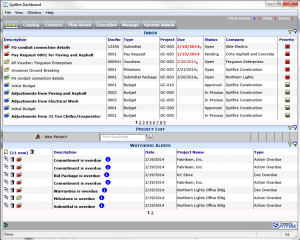 Every day I speak to owners or project managers at construction companies of various sizes. It’s my job to speak to these people and discover some of their pain points and issues regarding their project management system–if they even have one. On many occasions, I wind up speaking to small companies that do rather small projects. Most of the time, these companies either have no system in place or are using a series of stand-alone documents, emails and spreadsheets stored on a server so everyone has access. Since these are small companies, most of their projects get done, but not with real efficiency, nor without problems and mistakes.
Every day I speak to owners or project managers at construction companies of various sizes. It’s my job to speak to these people and discover some of their pain points and issues regarding their project management system–if they even have one. On many occasions, I wind up speaking to small companies that do rather small projects. Most of the time, these companies either have no system in place or are using a series of stand-alone documents, emails and spreadsheets stored on a server so everyone has access. Since these are small companies, most of their projects get done, but not with real efficiency, nor without problems and mistakes.
Leaving Your Comfort Zone
 I have a confession to make: although I work for a software development company, I am not a geek, and I don’t like change in either my hardware or software. Some months ago, I needed a new smartphone. I know people who get excited about new smartphones. But even after I chose a new one, and held my new phone in my hand, I could only fret about how it was different from my last phone. Of course, I got used to it (rather quickly as it turns out). Then, I got a new tablet. Again, my reaction was to stress about how I don’t know how to do everything I want on my tablet. Hmmm, I think I see a pattern here.
I have a confession to make: although I work for a software development company, I am not a geek, and I don’t like change in either my hardware or software. Some months ago, I needed a new smartphone. I know people who get excited about new smartphones. But even after I chose a new one, and held my new phone in my hand, I could only fret about how it was different from my last phone. Of course, I got used to it (rather quickly as it turns out). Then, I got a new tablet. Again, my reaction was to stress about how I don’t know how to do everything I want on my tablet. Hmmm, I think I see a pattern here.
Stop Already
 I had been planning to write something really technical and boring about scalability, but then I read in Dorothy’s blog last week about ⅓ of our time being wasted (my word) looking for our lost things. Wow. That’s really sad.
I had been planning to write something really technical and boring about scalability, but then I read in Dorothy’s blog last week about ⅓ of our time being wasted (my word) looking for our lost things. Wow. That’s really sad.
Then I heard that one of our newest clients was asking at the end of each training session “we can still use email, right?” (And the trainer would sigh and reply: “Yes, of course”). It is a good thing they don’t let me near those classes, because I would feel obligated to add “but only if you are a fool.”
TweetOrganize the Incoming
 David Allen, a time-management expert, states that we all know that a computer is a powerful tool that can make our work easier, faster and more efficient–but few of us are realizing these objectives. Why not? We don’t achieve our goals for the same reason we can’t find the television remote or our car keys. We are human and most of us don’t actually organize our work and/or follow that organization all the time. Most of us spend approximately one third of our time just trying to find our “lost things” even if they are on the computer. This is especially true for computer workers who share data and processes with co-workers.
David Allen, a time-management expert, states that we all know that a computer is a powerful tool that can make our work easier, faster and more efficient–but few of us are realizing these objectives. Why not? We don’t achieve our goals for the same reason we can’t find the television remote or our car keys. We are human and most of us don’t actually organize our work and/or follow that organization all the time. Most of us spend approximately one third of our time just trying to find our “lost things” even if they are on the computer. This is especially true for computer workers who share data and processes with co-workers.
The Right Tools
 We all know that keeping on top of things is critical. This is true both in our professional and personal lives. However, when certain circumstances present themselves, we are easily overwhelmed with information and the things we need to do even with the right tools at hand.
We all know that keeping on top of things is critical. This is true both in our professional and personal lives. However, when certain circumstances present themselves, we are easily overwhelmed with information and the things we need to do even with the right tools at hand.
